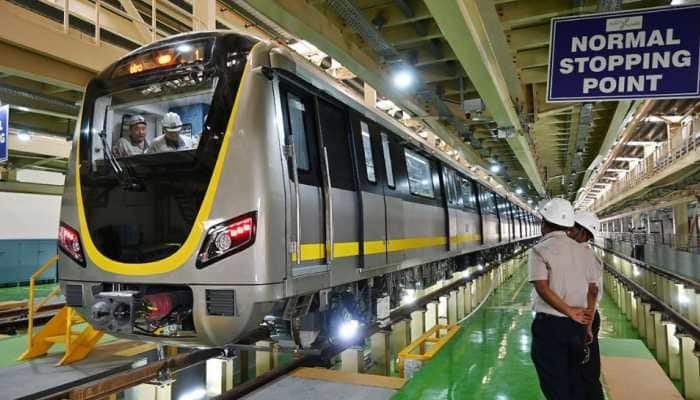Exclusive: How fast EV charging can promote a switch to cleaner mobility?
We got in touch with Anant Nahata, MD, Exicom, to understand how DC Fast chargers can start a new EV wave in India and what are the benefits of fast chargers?
Trending Photos
) Image for representation
Image for representation Recently, Kia India inaugurated India's fastest '240kWh' charger for EV passenger vehicles in Kochi. The fast EV charger is open to all EV owners in India, and not just Kia EV6 owners to have access to fast charging options. This fast charger is made by Exicom, a prominent player in EV chargers and EV batteries. Experts say that one of the biggest hurdles stopping EV penetration in India is the lack of fast charging options. The chargers being offered with vehicles are able to charge a vehicle in 6-8 hours. The fast chargers (mostly 50kW) can charge 80% in average EV in less than an hour. We got in touch with Anant Nahata, MD, Exicom, to understand how DC chargers can start new EV wave in India?
How is fast charging different from regular charging?
AC power is supplied to the vehicle and the on-board charger in a vehicle converts that AC current to DC before supplying it to the battery. In an AC charger, the rate of acceptance of power is limited because of reasons such as cost, weight, and space. In a DC charger, however, DC power is supplied directly to the battery, negating the limitations and conversions at the on-board charger. As a result, the DC charging increases the charging speed of the battery significantly. For example, an EV battery that takes about 8 hours to get fully charged on AC power can be charged by up to 80 per cent in under an hour using DC fast charging. This time can further come down in DC charging depending upon the charger and battery capacity.
The modern EVs can be charged even with chargers of over 200 kW. We recently provided Kia India with a 240 kW DC fast charger that is installed at their Kochi dealership. This is the fastest EV charger in the country. We have also provided Kia with several 150 kW fast chargers for many other dealerships in the country.
Despite benefits, why is fast charging not prominent?
Fast charging comes with its own set of challenges. The technology used in DC fast chargers is significantly expensive as compared to that in AC chargers. These chargers need to work at higher voltage and require additional insulation, superior cables and connectors.
DC fast charging also requires better thermal management system. The electrochemical process involved in charging an EV battery using DC fast charger can lead to rise in temperature of a cell and cause it to swell. Without any intervention, this could even cause a cell to explode. As a result of this, DC fast chargers require highly efficient thermal management systems.
And unlike an AC charger that can work with domestic power supply, a DC fast charger requires significantly higher power supply and cannot be used with a domestic circuit. This is why using DC fast chargers at a public charging station is almost 3X to 4X costlier than using AC charger.
How fast charging can promote cleaner mobility?
Fast charging for electric vehicles is admittedly one of the most effective means to promote acceptance of EVs. It is a solution to range anxiety and a robust fast charging network can drive the EV revolution in India. Fast charging can significantly reduce downtime and can have EV users on the go with very little waiting time.
What solutions Exicom is providing?
Exicom is the leader in India in providing EV charging solutions. We have developed advanced, high-capacity DC fast chargers that comply with stricter European standards. We have DC fast chargers ranging from 30 kW to 240 kW and these support multiple charging protocols such as CCS2/ CHAdeMO, and GB/T. These DC fast chargers can work in a wide temperature range.
Are Exicom's chargers installed in India and where?
Exicom has over 7,000 EV chargers installed in India in cities such as Delhi, Gurugram, Noida, Bengaluru, Jaipur, Hyderabad, Mumbai, Pune, Ahmedabad, Vishakhapatnam, Kolkata, Vijaywada, Coimbatore, Ranchi, Chandigarh, and Surat among others.
How important is BMS in electric vehicles?
If battery is the ‘heart’ of an EV then the BMS (Battery Management System) is the 'brain' of an EV. It controls the charging and discharging of EV batteries. Besides this, the BMS also helps monitor parameters such as battery pack temperature, individual cell temperature, battery's operational state, etc. and is crucial in ensuring that a vehicle battery operates within SOA (safe operating area). A BMS is also responsible for providing the user with desired information such as state of charge (SOC), real-time range, etc. A BMS also facilitates the communication between a charger and the battery pack of an EV.
Stay informed on all the latest news, real-time breaking news updates, and follow all the important headlines in india news and world News on Zee News.
Live Tv







)
)
)
)
)
)
)
)
)
)
